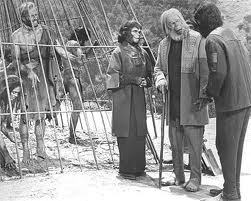History of Man?

The book, Guns, Germs, and Steel: The Fates of Human Societies, was filled with controversial facts. While the author does appropriately state some of the factors that trigger societal development, Scripture doesn’t support some of the facts and statements that he provided. There was a large emphasis on evolution, however the author did not fully back up his claims as the evidence provided could be interpreted in many different ways.
The first section of the book relayed the author’s opinion of the development of humans and human history. Diamond suggests that “modern humans diverged from the ancestors of the living great apes, around 7 million years ago.”[1] I disagree with him as the Bible states that God created man in His own image. The major scientific flaw in this theory is that apes today don’t evolve into humans, and humans have not continued evolving in modern history. Diamond says “human history at last took off around 50,000 years ago, at the time of what I have termed our Great Leap Forward.”[2] The dating is due to a find in East Africa of stone tools and jewelry, which were carbon dated to specific time periods. I believe this method of dating can be unreliable as it can be affected by ambient radiation, environment, and geographical location.
Throughout the next several chapters of his book, Diamond discusses environmental issues that affect the spread and development of societies. Using Polynesian societies as an example, he suggests that there are six environmental variables that affected the development of the societies: climate, geological type, marine resources, area, terrain fragmentation, and isolation.[3]
It has been proven that environmental variables can, and do, affect geographic migration and evolution of societal development and culture traits. As man developed, so did agriculture. With the development of farming, man was able to settle and build communities, which, resulted in the development of governments, religion, and culture. Many parts of the world are not suitable for agricultural development and “it should come as no surprise that food production never arose in large areas of the globe, for ecological reasons that still make it difficult or impossible there today.”[4]
Diamond states that “the spread of government and of religion have thus been linked to each other throughout recorded history, whether the spread has been peaceful (as eventually with the Fayu) or by force. In the latter case it is often government that organizes the conquest, and religion that justifies it.”[5] Even in modern times, religion (or the lack thereof) has caused the rise and fall of nations and the attempt to extinguish entire people groups. For example, Hitler attempted to eliminate the entire Jewish race during World War II. The quest for power or structure has led to both positive and negative government involvement within society. Diamond suggests that there are three reasons why humans develop a governmental system.
- To solve a problem.
- A decision by a group of individuals based on their opinion that there is a need for a formalized government.
- To provide structure and oversight for a complex system developed over time.
The ability for societies to obtain and develop technology also plays a role in human expansion. Depending on their physical location, societies differ in how readily they can receive technology by diffusion from other societies.[6] This is evident today as use of technology has been limited in certain countries, which can slow or stagnate development. Countries such as North Korea and Cuba have economical and technological restrictions placed upon them due to their perceived hostility and threat to other countries. Since 2011, governments have made an effort to stop the proliferation of weapons and technology to terrorist groups. While terrorist groups are not an official government, they are considered a political organization. Human ingenuity has impacted the development and spread of cultures throughout history. For example, when Europe started colonizing the Americas they were able to conquer the native people with “military technology use of guns, steel weapons, and horses.” The strong have dominated the weak, and those with military power generally overcome their less developed neighbors. Whole societies and peoples have been wiped out, such as the South American Indian tribes during the Spanish conquest. This devastation was so complete that many of the records of their existence were destroyed and very little is known about their customs or society.
Disease and health issues play a major role in society and culture. “The major killers of humanity throughout our recent history—smallpox, flu, tuberculosis, malaria, plague, measles, and cholera— are infectious diseases that evolved from diseases of animals, even though most of the microbes responsible for our own epidemic illnesses are paradoxically now almost confined to humans. Because diseases have been the biggest killers of people, they have also been decisive shapers of history.”[7] In church history, the black plague helped to fuel the growth of the church.
I believe that Diamond did a thorough job covering the primary reasons for modern societal development, such as agriculture, disease, technological development, religion and government. However, in his attempt to explain early development of man and society, the scientific facts that he provided are inconclusive. The facts provided do not give a strong enough credence to his theories.
Leave a Reply
You must be logged in to post a comment.